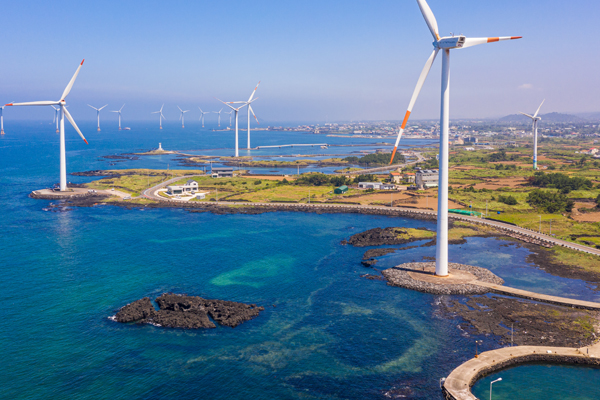Let us be together and anew again!Kunsan National University always stands by you and raises the value of future with you!
The College of Computer and Software
The College of Computer and Software aims to cultivate software talents suitable for the fourth industrial revolution. It is a specialized college where students can learn various cutting-edge studies such as artificial intelligence, big data, the Internet of Things, and next-generation communication technologies.
It teaches both theory and practice in a balanced manner, enabling students to methodically acquire studies that reflect emerging technological trends. Additionally, the college has already developed and implemented higher-quality education and a superior support system for students than any other universities, colleges, or departments.
Through the full support from the university and the SW-centered university projects, we are focusing on strengthening field-centered education through industry-university cooperation and developing creative problem-solving abilities.
By providing various projects and internship opportunities, we enable students to obtain practical experience in real industrial environments and to develop into globally competitive IT professionals.
The College of Computer and Software is making every effort to ensure that it becomes a core academic unit that fosters the leaders of the future technology society.
Greetings from the dean VIEW

The College of Ocean & Bioscience
As the only educational institution in the West Coast area with the largest oceans, fisheries, and bio infrastructures, the College of Ocean & Bioscience provides a variety of educational and research programs to cultivate major talents with creative abilities, specialized in marine and bio sectors.
It consists of a total of eight departments: The Department of Biological Science, the Department of Public Service in Ocean & Fisheries, the Department of Aquaculture and Aquatic Science, the Department of Marine Biology, the Department of Aquatic Life Medicine, the Department of Food and Nutrition, the Department of Marine Engineering, the Department of Food Science and Biotechnology.
Each department covers all majors in the marine, fisheries, and bio sectors where traditional and high-tech industries coexist harmoniously, and has an educational foundation for acquiring expertise through a wide range of education and research from basic to application.
In particular, it focuses on developing new technologies to overcome the climate crisis and new industrial ecosystems based on them. It will play a pivotal role in developing the West Coast by cultivating convergence talents in the marine, fisheries, and bio sectors in line with the era of the 4th industrial revolution.
Greetings from the dean VIEW

College of Business
The College of Business a specialized college consisting of management-related departments such as management, trade, economy, accounting, logistics, and venture start-ups, etc.
Every department conducts in-depth research and education on current paradigms, fundamental management theories, techniques, and cases of global businesses, and seeks scientific methodologies that can be applied practically in businesses.
The Excellent faculty members of each department run the best major curricula, improve students' employability through nonsubject programs pertaining to industry-university cooperation, and actively support students to grow into leaders in the knowledge-based economy and high-tech-oriented management paradigm.
In the College of Business, students can have the opportunity to become leaders in the era of the 4th industrial revolution, and can realize their future dreams and hopes by developing qualities and expertise as an 'innovative business leader'
Greetings from the dean VIEW

College of Interdisciplinary Studies
Welcome to the College of Interdisciplinary Studies where 'Innovation' and 'Individuality' come together!
The College of Interdisciplinary Studies at Kunsan National University aims to cultivate talents with the self-designing capacity that the future society wants as well as glocal convergence skills that lead the region and the world.
In order to do this, we have created curricula that are both student-tailored and innovative, allowing students to choose their own majors and careers.
The College of Interdisciplinary Studies currently consists of five schools(departments): The School of Liberal Studies, the Department of Fine Art, the Department of Music, the Department of Naval Architecture and Ocean Engineering, and the School of Global Convergence.
The five departments (schools) assist students in developing the creative and convergence abilities necessary to adapt to the fourth industrial revolution and changes in the AI era through professional curricula and programs.
If you are interested in 'integrating technology and art, exploring the intersection of science and ethics, and pioneering new disciplines,' come to the College of Interdisciplinary Studies right now! Here, you can turn your vision into a reality.
Greetings from the dean VIEW

The College of Convergence Science and Engineering
It aims to break down the boundaries of science and engineering and to integrate knowledge from various disciplines in order to cultivate students with creative and innovative problem-solving skills.
The College of Convergence Science and Engineering covers various fields such as semiconductor physics, material chemistry, and mathematics in science and new material engineering, electrical engineering, electronic engineering, civil engineering, marine construction engineering, chemical engineering, and environmental engineering in engineering, and focuses on creating new knowledge and skills through interdisciplinary convergence.
In addition, in order for students to gain the practical skills needed in actual industries, the College of Convergence Science and Engineering strengthens the industry-university cooperation programs.
Through the practice-centered curriculum and various research projects, students can acquire not only theories but also practical skills, and can have the ability to quickly adapt to the rapidly changing technological environment. The College of Convergence Science and Engineering will do its best to cultivate leaders in next-generation science and technology, and to produce convergent, creative talents required in the era of the 4th industrial revolution.
Greetings from the dean VIEW

- Department of Electronic Engineering
- Department of Electrical Engineering
- Department of Materials Science and Engineering
- Department of Chemical Engineering
- Department of Environmental Engineering
- Department of Civil Engineering
- Department of Coastal Construction
- School of Advanced Science and Technology
- Department of Mathematics
The College of Humanities Contents Convergence
The College of Humanities Contents Convergence consists of the Department of Korean Language and Literature, the Department of English Language and Literature, the Department of Japanese Language and Literature, the Department of Chinese Language and Literature, the Department of History, the Department of Philosophy, and the Department of Teachers Education.
The seven departments, where students acquire the languages and cultures of Korea and the world, and explore the history and thoughts of mankind, have cultivated humanities-integrated talents who can respond to the changes of the times through professional curriculum and educational programs.
The College of Humanities Contents Convergence aims to cultivate intellectuals with liberal arts knowledge, professionals who lead social fields, practical persons with creative ability, and international persons with a balanced cultural sense.
Greetings from the dean VIEW

School of ICC
The School of ICC is spurring up the university’s great transformation for change and innovation by changing the structure from specialized 16 undergraduate schools and 19 majors based on the Industrial Collaboration Center (ICC) in 2024 to 13 undergraduate schools and 6 majors for the second semester of 2024.
In particular, the School of ICC, an educational system responding agilely to rapid industrial change, is a core project for the Kunsan National University’s great transformation that seeks to achieve the shared growth of the local community and the university by breaking down the boundaries between departments, universities and communities, and domestic and overseas areas by strengthening two-way and win-win value-based industry-university cooperation centered on university specialization, regional strategic industries, and specialized industries.
Greetings from the director VIEW

- School of Media and Culture
- School of Child Care
- Department of Social Welfare
- College of Law, Public Administration and Police
- School of Nursing
- School of Sports and Exercise Sciences
- Department of Industrial Design
- School of Clothing & Textiles
- Dept. of Maritime Police Science
- School of Mechanical Engineering
- School of Architecture & Building Engineering
- School of Spatial Design & Fusion Technology
- Department of Energy Science & Engineering







